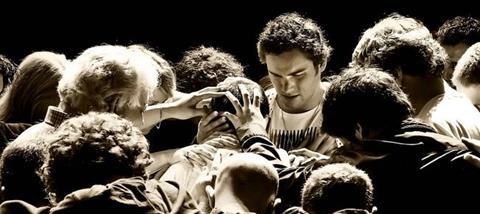
I have found there are times when we can’t hear what we need to hear from the Church, so we have to hear the message from someone outside instead. Someone who can hold a mirror up to reveal to us how we're doing.
A recent article which appeared on the BBC and was entitled ‘Stop Trying to Heal Me’ is a classic example of this. It stretched my theology at times, and even though I didn't necessarily agree with all of it, I also learned a huge amount through reading it.
The article explained how disabled people are often approached by Christians offering healing prayer. Although well-intentioned, these moments have left the writer Damon Rose feeling "judged as faulty and in need of repair".
I was moved by his words. It must be incredibly frustrating for anyone who lives with a disability, struggle, or sickness to have someone else try and determine what they need for them.
Sometimes the Church is so good at doing we never actually stop and listen.
Too often we are busy looking for the latest formula to fix what we can’t reconcile or explain. Yet listening is one of the greatest gifts we can give to one another.
Just because we want healing for someone, does not mean they want the same thing. Just because we think healing comes in a certain way, that does not give us the right to impose those practices on others, especially when its uninvited.
Understanding prayer
Prayer is the gift of relationship. But even prayer can be used to try and get something from God that he may not be doing at the time. We should never force God on people whether that be in how we pray, how we talk or how we live.
The Apostle Paul encourages us: “As holy people...be sympathetic, kind, humble, gentle, and patient” (Colossians 3:12 GWT). If how we pray for others doesn’t emphasise sympathy and kindness, with a gentle and patient approach, we are operating from a man-made model.
Paul reminds us in 2 Corinthians that we are called to "Share in the sufferings..." (not "fix the sufferings") of those around us (1:3-7). We are called to share, not fix. Our role is to be present, and to stand alongside.
What I found so interesting about this article was the idea of what healing looks like is also different for each person. Some might want the person being prayed for to get out of their wheelchair. But what if the person being prayed for doesn't want that?
It won’t be until we are in heaven that complete healing will take place. It's then that we will experience the redemption of our bodies which Paul speaks about in Romans 8. But even then, what if our understanding of healing has been wrong? Could it be that wheelchairs will in fact be in heaven? Just because we categorize what healing looks like for one, does not mean healing will look like that for another. And why would it be if each of us is so uniquely made?
When you pray...
Our approach to prayer might be in need of a makeover. We have often used prayer as a tool to feed the ego or some need within the person praying, rather than remembering we aren’t called to pray in order to get a nice testimony or build some ministry. We are called to pray because Jesus showed us how. He showed us prayer is intimate relationship with the Father. And when we pray for others it’s a privilege, a sacred act of intimacy between a person and their God. If we can’t see the person we’re praying for in the way God sees them, we are missing the point of prayer ministry.
Jesus never used anyone to build some worldwide ministry. He loved and served people unto himself. He wept. He was present with those who were stigmatized or left out on the fringes. 'Being with, and walking alongside' seems to be the model Jesus lived.
So when we pray, it’s good to be reminded, people aren’t to be used in order for the Church to talk about herself on some highlight reel played at some event. Prayer is about a person. People are never conditions. They are people. Each individual made in the very image of God. Therefore, seeing each person not as an 'assignment from God to fix', but rather a person to learn more about in order to love more effectively is the Church's call, and truth is its really what people are in need of.
Education as love
People have asked me the last few years how to help those who are living with mental illness, disabilities, chronic pain or suicidal ideologies and I think one of the most loving acts we can do is to learn about what people live with. Who are they outside of what struggle they may be living with? Choosing to learn about an area someone is living with communicates something. It says, "I love you enough to take the time to learn more about your life." To get educated is a loving act.
Let's also get educated on what people want. Let's not assume we know how people want to be prayed for. Not everyone see’s healing or heaven the same. We must listen and readjust to a message the world is telling the Church: Stop using me. Stop trying to fix me. And more importantly ‘can you just listen and see me as a person and not a ministry assignment?’ I don’t think that’s just a message from the world to the Church, but a message to the Church for the Church.
Christy Wimber has been involved in church ministry for over two decades. She is now focused on leadership, mental health and the training of leaders and planting of new churches. Her latest book is entitled Wholeness: Changing how we think about healing (Lion Hudson). Her main ministry has always been her children, Camie Rose, who is now married to Hobie Johnson, and John Richard II who is still in high school. For more information visit ChristyWimber.com
Enjoyed that? Get more articles covering news, culture, faith and apologetics in every print issue of Premier Christianity magazine. Subscribe now





























